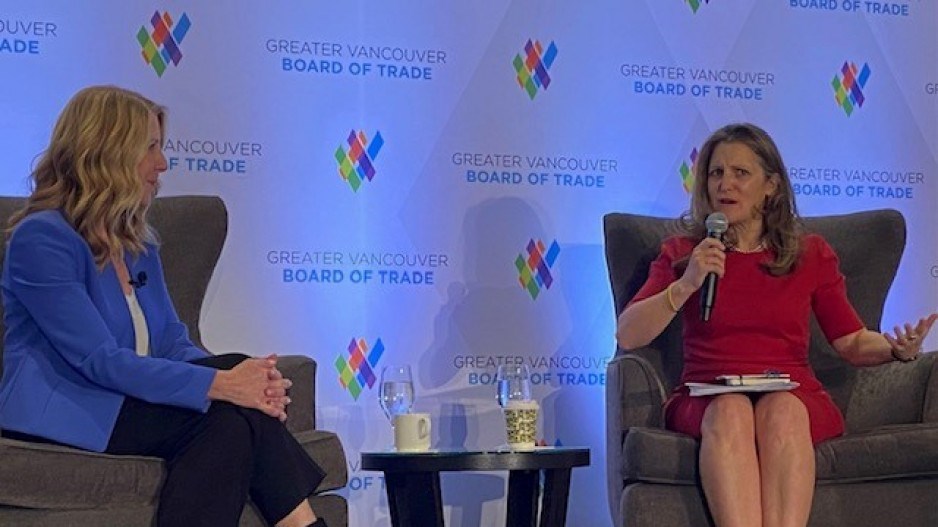Clean and green, but not very lean. That’s how the Conference Board of Canada summarized Finance Minister Chrystia Freeland’s budget Tuesday.
The Business Council of BC (BCBC) was more blunt, calling it “an endless stream of red ink” at a time when government should be trying to help fight inflation by reducing the amount of money sloshing around the economy.
And Freeland’s provincial counterpart, B.C. Finance Minister Katrine Conroy, expressed disappointment that Freeland’s budget provides no serious measures or money for housing.
Freeland was in Vancouver Thursday to answer some of these criticisms and defend her budget to a business audience of the Greater Vancouver Board of Trade (GVBOT).
Freeland's budget includes spending that is expected to exceed revenues by an estimated $40 billion. The two big ticket items in the budget is a new national dental care program and spending on the green economy.
GVBOT CEO Bridgitte Anderson pressed Freeland on her budget’s lack of significant measures or money for housing, which remains one a top concern in B.C.
Anderson noted the BC Real Estate Association has estimated 43,000 new homes would need to be built in B.C. every year for the next five years to absorb the influx of new immigrants Ottawa is planning to bring in. Yet there is very little in Freeland’s latest budget that addresses housing.
“And yes, there was mention of housing in last year's budget but not a mention here,” Anderson said. “Why was that, given immigration and housing needs to be correlated?”
Freeland noted that budget 2022 contained $10 billion in funding for housing, spread over several years. And she put the ball back into local government’s court, suggesting NIMBYISM was one reason for new homes not getting built in B.C.
“I do think on housing, municipal governments and provinces need to also step up and recognize their responsibilities and we're happy to do that in collaboration with them,” Freeland said.
One business-friendly measure in the budget is a new agreement the federal government has struck with Visa and Mastercard to reduce credit card processing fees for small businesses. Other than that, there’s not much in the budget for businesses to get excited about, unless they are in the clean energy space.
And as the BCBC pointed out, that's only about three per cent of the Canadian economy.
“For the other 97 per cent of the economy, Budget 2023 offers little or nothing,” the BCBC said. It also said Freeland’s $40 billion deficit works against attempts by the central bank to rein in inflation with higher interest rates.
“In contrast to last year’s budget, which showed some glimmers of fiscal responsibility by positing a return to surplus at the end of the fiscal planning horizon, Budget 2023 plans for an endless stream of red ink through to at least 2027-28,” BCBC said in a budget response.
The Trudeau government has been under pressure to respond to U.S. President Joe Biden’s Inflation Reduction Act (IRA), which has been described by Clean Energy Canada as “part industrial strategy, part climate plan and part social justice — all with a protectionist bent.”
The IRA includes about $400 billion worth of incentives, credits and subsidies to attract investments in renewable and nuclear energy, carbon capture and storage, electric vehicles and all other things green.
Freeland responded Tuesday with some multi-billion dollar green credits of her own. The budget she handed down Tuesday includes “the biggest ever investment in the clean economy in Canadian history,” she said -- $80 billion over 10 years.
New incentives include a 15 per cent refundable tax credit for investments in renewable energy (including large-scale hydro power), nuclear power and “abated” natural gas fired electricity production. Public utilities like BC Hydro will be eligible for the new tax credit. The budget also includes a refundable investment tax credit of 15 to 40 per cent for hydrogen production.
To meet climate change commitments, a whole lot of fossil fuels will need to be displaced with "clean" (i.e. non-emitting) electricity. That will require a massive amount of new generating capacity as well as storage and transmission.
“We're going to need a lot of electricity,” Freeland said. “Canada is going to need to double the amount of electricity we generate by 2050. That is a lot of building. I’m counting on you to do it.
“You know, we understood a century ago, as Canadians, that to build Canada, we had to build a railway connecting our country from coast to coast, that we had to build that spine of our economy and our country. I think electricity is the railway of the 21st century economy.”
As for conventional energy, like oil and gas, Freeland conceded that Canada has missed window of opportunities to build big energy projects like LNG export terminals.
"I would like us to have moved faster in the past and I want us to move very quickly," Freeland said. "Now, where I do disagree Bridgette is this is not a window that is closing. This is a window that is wide wide open."
Russia's war in Ukraine has fundamentally roiled oil and gas markets, leaving opportunities for Canadian oil and gas.
"Europe has really understood the historic folly of its dependence on Russia for energy and it will be a long time before Europe reverts to status quo...and that means there is a huge gap in the world's energy supply. And I think that's a gap that we can we can and should help fill."



